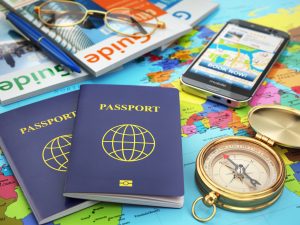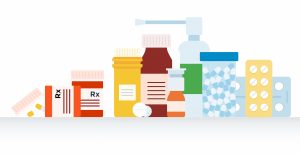
As the pandemic winds down, more countries are opening their borders to international visitors. The postponed trips to see loved ones, business trips, tourism and medical tourism are slowly becoming a reality. Given a little forethought and planning will make your travel plans go smoothly.
We will cover the following:
- The everchanging landscape of mandates, quarantines, isolation, and vaccinations for each country, can cause confusion surrounding rules and regulations with each country. Do you need to be vaccinated against covid or will a negative covid test do? Quarantine?
- What are recommended medications to bring while traveling?
- How do I travel with medications, especially prescription medication?
- How do I locate medical attention and medication if there is a medical emergency while out of the states?
Covid travel and restrictions
Due to the evolving nature and rules surrounding these questions the CDC travel destinations page has an alphabetical list of countries and their restrictions regarding covid 19 and immunizations. As your planned trip get closer, please check back with this site as the rules frequently change.
When traveling abroad, you are exposed to different germs, time zones, food, and water. A little planning and equipped with the right medications will help make your trip enjoyable and keep you out of a health clinic or hospital in a land where it may be difficult or near impossible to source healthcare.

Medications to Have While Traveling
Note: Many nonprescription medications have interactions and can be dangerous if taken by individuals with prescribed medications or health conditions. As with all medications consult your primary care provider. Follow the hyperlink (to Drugs.com) associated with each medication listed for more information.
Note: As with all drugs, if pregnant, nursing or using with small child always consult your primary care provider for guidance.
- Anti-diarrheal, such as Kaopectate or Pepto Bismol (bismuth subsalicylate) In case of mild diarrhea from contaminated food or water (also known as travelers’ diarrhea) or lack of hygienic practices this medicine is especially important. When traveling, you may not be able to easily locate restrooms. If you are between flights, or in a vehicle where no facilities are available for an extended period of time this medicine can prove to be invaluable. Be sure to stay hydrated while experiencing diarrhea symptoms. Other uses include upset stomach and nausea. If diarrhea continues past a few days or fever present, an antibiotic may be indicated. (See Jase case below)
Note– Do not use if bleeding ulcer, abdominal pain (other than mild cramping) or allergy to aspirin, or with small children. There are drug interactions, check with care provider before using. Do not use more than 2 days or when fever present.
- Laxative/stool softener-Colace 2-in-1 Docusate/senna When traveling across time zones, out of your regular routine, eating strange foods, and limiting liquids while on the road, constipation can strike. A mild laxative with stool softener can help alleviate these symptoms. Be sure to drink plenty of liquids when taking a laxative. Do not use if rectal bleeding or upset stomach are present. Do not take for longer than a week if no bowel movement after one day of use.
- Anti-nausea/motion sickness– Dramamine, (dimenhydrinate) Whether on a cruise, plane, train or traveling by car, motion sickness can ruin a much-anticipated trip. If you are prone to motion sickness, use 30-60 minutes before travel. This medication can cause sleepiness and reduced reflexes as a side effect. There are numerous side effects and interactions and cautions when using this medication. Kidney and liver disease, glaucoma, overactive thyroid, high blood pressure are just a few of the contraindications for use. Do not drive or operate machinery while using.
- Pain reliever, fever reducer, anti-inflammatory– Tylenol (acetaminophen), Advil (ibuprofen) or Aleve (naproxen) Depending on preference- single dose packs of pain relievers. Discuss with your primary care provider which they recommend. Care must be taken with any pain reliever/ fever reducer/ anti-inflammatory. There are many health conditions and medication interactions that can dictate which pain reliever to take. Note: Tylenol is not anti-inflammatory. Advil and Aleve are. There are many differences between the different pain relievers. Tylenol is recommended to take every 4-6 hours (there is a timed release one that is taken every 8 hours), Advil every 6- 8 hours. Aleve is taken every 12 hours, which may be more convenient when traveling, however it is not recommended for small children.
- Antihistamine Benadryl (diphenhydramine) Benadryl has many uses. As an antihistamine it works to help relieve allergic symptoms such as water eyes, sneezing and runny nose. It is also useful as an anti-nausea medication and is used extensively in nursing homes as a sleep aid. Benadryl can cause drowsiness and should not be taken with alcohol. Young children should not take unless recommended by their care provider.
- Jase Case The 5 prescription antibiotics found in this pack can treat many illnesses encountered by travelers. From urinary tract infections to infectious diarrhea to infected wounds to pneumonia and more, this pack of antibiotics can prove indispensable and bring peace of mind. Medical care may be difficult to locate, sourcing the correct medicine to treat symptoms could be even harder. As a prescription medication, travel between countries becomes much easier. The booklet provided covers a wide array of health conditions which will guide you as to whether to take an antibiotic and which one to take if needed.
- Prescription medications and supplements– Make sure your medications are properly labeled and stored correctly. Traveling out of country can present challenges. Be sure to have plenty of medications on hand (at least a week or more) in case of travel delays.
More information when traveling with prescription medications and supplements:
(Taken from the CDC website on travel)
- Make an appointment with a travel medicine specialist or your health care provider to get needed vaccines and medicines at least 4 to 6 weeks before you leave.
- If you plan to be gone for more than 30 days, talk to your doctor about how you can get enough medicine for your trip. Sometimes insurance companies will pay for only a 30-day supply at a time.
- Ask your doctor about any changes to taking your medicine once you’re in a different time zone. Medicines should be taken according to the time since your last dose, not the local time of day.
- Ask how to safely store medicine and check whether it needs refrigeration. Keep in mind that extreme temperatures can reduce the effectiveness of many medicines.
- Pack smart and put your medicines and supplements in your carry-on luggage. You don’t want to be stuck without them if your suitcase gets lost!
- Bring enough medicine to last your whole trip, plus a little extra in case of delays.
- Keep medicines in their original, labeled containers. Ensure that they are clearly labeled with your full passport name, doctor’s name, generic and brand name, and exact dosage.
- Bring copies of all prescriptions, including the generic names for medicines.
- Leave a copy of your prescriptions at home with a friend or relative in case you lose your copy or need an emergency refill.
- Pack a note on letterhead stationery from the prescribing doctor (preferably translated into the language understood at your destination) for controlled substances, such as marijuana, and injectable medicines, such as EpiPens and insulin.
- Check with the foreign embassy of the country you will be visiting or passing through to make sure your medicines are permitted in that country.
-
- Be aware that many countries only allow taking a 30-day supply of certain medicines and require the traveler to carry a prescription or a medical certificate.
- If your medicine is banned at your destination, talk with your health care provider about alternative medicine or destination options, and have your doctor write a letter describing your condition and the treatment plan.
- The International Narcotics Control Board (INCB) provides general information about country regulations for travelers carrying medicines that are made with controlled substances. It’s important to note that INCB may not have information from all countries or territories.
If you must buy drugs during your trip in an emergency, there are ways to reduce your chances of buying counterfeit drugs:
- Contact the nearest US embassy or consulate. They should be able to connect you with doctors and pharmacies that can help you find reliable, quality medicines.
- Buy medicines only from licensed pharmacies and get a receipt. Do not buy medicines from open markets.
- Ask the pharmacist whether the drug has the same active ingredient as the one you were taking.
- Make sure the medicine is in its original packaging.
- Look closely at the packaging. Sometimes poor-quality printing or otherwise strange-looking packaging will indicate a counterfeit product.
A few additional items when traveling
- Water purification tablets these tablets take a few hours to work when added to water but are effective in purifying water polluted with chemicals and bacteria.
- Small bandages for minor cuts and blisters
- Small set tweezers and scissors (may need to check these with luggage)
- Moleskin for prevention and pain relief from shoe friction
- A few packets of oral rehydration solution powder
- Lifestraw water bottle with filter– filters bacteria and chemical pollutants, and are handy when enroute to destination
- Small pack of hand wipes for times when facilities with water and soap are unavailable
- Small packs triple antibiotic ointment
- Small penlight with batteries
